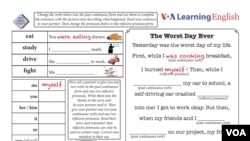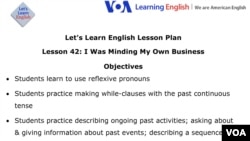Lesson 42: I Was Minding My Own Business
Let’s Learn English เปิดโอกาสการเรียนรู้และฝึกทักษะภาษาอังกฤษ ในรูปแบบที่ถูกออกแบบโดยผู้เชี่ยวชาญตามมาตรฐานการศึกษาของอเมริกา เพื่อให้เนื้อหาเหมาะสำหรับผู้เริ่มเรียนภาษาอังกฤษ
เรานำเสนอ 52 บทเรียน และทุกๆ 5 บทเรียน จะมีการทบทวนสิ่งที่เรียนไปแล้ว
ทุกสัปดาห์จะมีบทเรียนใหม่ พร้อมด้วยวิดีโอ ที่สะท้อนชีวิตชาวอเมริกันรุ่นใหม่ ผู้เรียนจะได้ฝึกการพูด เขียน และจดจำคำศัพท์
นอกจากนั้นผู้เรียนสามารถพิมพ์บทเรียนที่ทำแล้ว ผลการฝึกฝน และแผนการฝึกเรียนภาษาอังกฤษในบทต่อๆ ไปได้
เราอยากให้คุณติดตามบทเรียนใหม่ๆ ทุกสัปดาห์ และบอกให้เรารู้ถึงการเรียนรู้ของคุณผ่านการแสดงความคิดเห็น (comment) และอีเมล์ของเราที่ thai@voanews.com
เรื่องย่อ
แอนนาเห็นคดีชิงทรัพย์เข้าและอยากจะช่วยจับตัวหัวขโมยรายนั้นให้ได้ แต่กลายเป็นว่าเธอต้องแขนหักเพราะการนี้ แต่ผู้สื่อข่าวกลับอยากรู้เพียงว่า แอนนาไปแขนหักตอนไหนกันแน่?
ฝึกพูด
ในวิดีโอนี้ คุณจะได้เรียนรู้คำศัพท์ใหม่ๆ และเรียนรู้การใช้สรรพนามแสดงประธานของประโยค (reflexive pronouns) เช่น herself ourselves และ yourself
ฝึกออกเสียง
ใช้วิดีโอนี้ในการทำความเข้าใจการออกเสียงภาษาอังกฤษคำว่า "did you" อย่างรวดเร็วว่า /didjə/
บทสนทนา
Guy: Hello. I'm Guy Newsman with News Channel XYZ. I’m here in Washington, D.C. at the scene of a crime.
ฝึกเขียน
ในบทเรียนนี้ แอนนาทำแขนตัวเองหักที่เครื่องกดน้ำหยอดเหรียญ แล้วคุณเคยมีประสบการณ์ทำตัวเองเจ็บแบบแอนนาบ้างหรือไม่? เขียนหาเราที่ช่องแสดงความเห็นด้านล่าง หรือ อีเมลหาเรา
คลิกที่ภาพด้านล่างเพื่อดาวน์โหลด เอกสารประกอบการเรียน และฝึกการเขียนและใช้ประโยค past continuous tense และ สรรพนามแสดงประธานของประโยค (reflexive pronouns) ดูบ้าง
กลยุทธ์การเรียนรู้แบบลัด
Learning Strategies หรือ กลยุทธ์การเรียนรู้ คือความคิด ความตั้งใจ และการกระทำ ที่ช่วยให้การเรียนง่ายขึ้น หรือมีประสิทธิภาพมากขึ้น
กลยุทธ์การเรียนรู้ของบทเรียนนี้ คือ Read Between the Lines หรือ การตีความจากความหมายที่แฝงไว้
ในบทเรียนนี้ ผู้สื่อข่าว กาย นิวส์แมน ถามแอนนาหลายคำถาม และแอนนาได้เล่าหลายเรื่องเกี่ยวกับคดีชิงทรัพย์นี้เสียยืดยาว แต่ไม่ได้บอกว่าแอนนาเจ็บตัวในตอนสุดท้ายได้อย่างไร แต่กายพอจะตีความจากเรื่องที่แอนนาเล่า และพอจะรู้ว่าแอนนาทำแขนตัวเองหักได้อย่างไร
แล้วคุณเคยใช้ทักษะการตีความจากความหมายที่แฝงไว้ ในการเรียนภาษาอังกฤษหรือไม่? เขียนหาเราที่ช่องแสดงความเห็นด้านล่าง หรือ อีเมลหาเรา
สำหรับครูผู้สอน คลิกที่ Lesson Plan สำหรับรายละเอียดกลยุทธ์การสอนในบทเรียนนี้
แบบทดสอบความเข้าใจด้วยการฟัง
ทดสอบความเข้าใจในบทเรียนนี้ด้วยแบบทดสอบการฟัง คลิกที่วิดีโอนี้ และเลือกคำตอบที่ดีที่สุด
______________________________________________________________
คำศัพท์ใหม่
|
Subject Pronouns (Lesson 2) |
Object Pronouns (Lesson 18) |
Possessive Adjectives (Lesson 15) |
Possessive Pronouns (Lesson 37) |
Reflexive Pronouns (Lesson 42) | |
|
1st person |
I |
me |
my |
mine |
myself |
|
2nd person |
you |
you |
your |
yours |
yourself |
|
3rd person (female) |
she |
her |
her |
hers |
herself |
|
3rd person (male) |
he |
him |
his |
his |
himself |
|
3rd person (neutral) |
it |
it |
its |
(not used) |
itself |
|
1st person (plural) |
we |
us |
our |
ours |
ourselves |
|
2nd person (plural) |
you |
you |
your |
yours |
yourselves |
|
3rd person (plural) |
they |
them |
their |
theirs |
themselves |
______________________________________________________________
เอกสารประกอบการเรียน
ดาวน์โหลด VOA Learning English Word Book สำหรับพจนานุกรมคำศัพท์ที่ใช้สำหรับบทเรียนนี้
ในแต่ละบทเรียนของ Let’s Learn English เรามีชุดฝึกทบทวน Activity Sheet สำหรับการฝึกเพิ่มเติมที่คุณทำได้เอง โดยเฉพาะการฝึกใช้ประโยค Past continuous และสรรพนามแสดงประธาน (Reflexive Pronoun)
ครูผู้สอน
คลิกที่ Lesson Plan ในบทเรียนนี้ เพื่อเป็นแนวทางในการเรียนการสอนในห้องเรียนของคุณ หรือ อีเมลหาเรา หากมีคำถามหรือคำแนะนำในหลักสูตรนี้
ไวยากรณ์ที่ควรใส่ใจ: สรรพนามแสดงประธาน (Reflexive pronouns), ประโยค While-clauses (While + V.ing, V.1), Past Continuous Tense (was/were + V.ing)
หัวข้อหลักในบทเรียนนี้: การอธิบายถึงสิ่งที่ผ่านมาแล้ว, การถามและให้ข้อมูลในอดีต, การอธิบายเรื่องราวเป็นขั้นตอนก่อนหลัง, การอธิบายความกังวลเกี่ยวกับคนอื่น, การแสดงความเห็นกับเรื่องราวเลวร้าย, การแสดงความเห็นใจ
กลยุทธ์การเรียนรู้แบบลัด: การตีความจากความหมายที่ซ่อนอยู่
การฝึกพูดและการออกเสียงที่ควรใส่ใจ: การออกเสียงสรรพนามแสดงประธาน (Reflexive pronouns), การออกเสียงคำว่า Did you อย่างรวดเร็ว /didjə/
____________________________________________________________
ตอนนี้คุณสามารถบอกเราได้ว่าคุณคิดอย่างไรกับบทเรียนนี้ ด้วยการเขียนอีเมลหาเรา หรือแสดงความคิดเห็นมาที่ช่องแสดงความคิดเห็นด้านล่าง หรือส่งมาทางหน้า Facebook

















